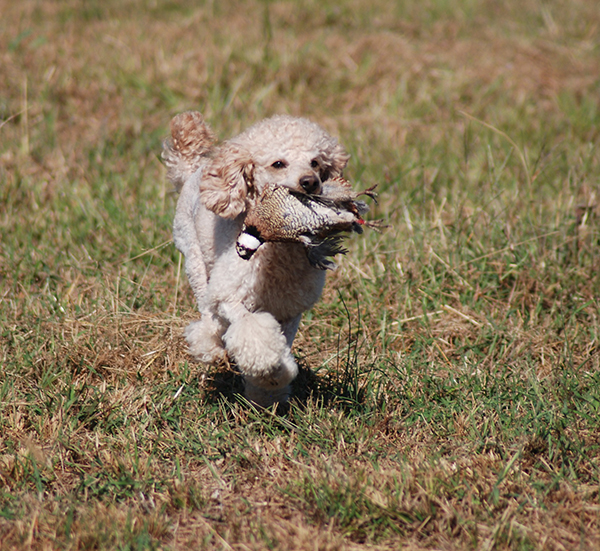
Be “in” dogs long enough, and you’ll have heard that toy breeds just want to sit on someone’s lap, a good thing because they’re difficult to train. Poppycock. Toy breeds are game to do anything their owners are game to do.
We’ve read of “Sweet Pea,” a Brussels Griffon with a MACH title (Master Agility Champion), “Rocketman,” a Cavalier King Charles, and another MACH title holder, “Momo,” a six pound Chihuahua (whose name in Japanese means “Peach”) who joined the search and rescue division of the Nara, Japan police force in 2010, “Waldo,” another Brussels Griffon, and an accomplished draft dog, and Mr. Cinnamon Bun, AX, MXJ, NAC, OAJ, NAW, TBAD, CG, CGC, the First Yorkshire Terrier to ever earn an Earthdog Title from the American Working Terrier Association. Toy Poodles have been used in France and Germany as hunting dogs, Yorkshire Terriers can be wicked ratters, and at one time, the most AKC-titled dog of any breed (and may still be), was a Papillon named, CH and OTCH Loteki Sudden Impulse, UDX, TDX, MX.
It’s possible that any encountered difficulties with toy breeds have more to do with the people in their lives than their breed. Because toy breeds are so small, a common mistake is to simply pick them up and take them anywhere they need to go, including the great outdoors for bathroom breaks. Toy breeds are still dogs, and they should walk on their own just as as big dogs do. Avoiding mistakes is always better than disciplining mistakes, and toys that learn expectations early on fare better.
We’d love to hear from toy breed owners who work with their dogs. What are your tips, what has been your experience – what say you?
Image of hunting Toy Poodle found on Pinterest and happily credited upon receipt of information

My Chihuahua enjoys Agility as much as my Labradors do.
Love the picture, Darla!!
I’m surrounded by barking toy breeds that clearly are in desperate need of something to do!
Almost a toy, my mini dachshund is no lap dog. He does agility, barn hunt, earth dog, lure coursing, obedience, rally, tracking, tricks, and works in the community theater.
Fabulous picture, Leslie (winkie winkie, love the sign) – we LOVE hearing about all the things our dogs can do, and of owners like you who are so engaged with their dogs. Well done!
The little guys do well in the agility school I attend, I have never gotten the impression that they’re any dumber than dogs of greater sizes, and often seem more responsive and alert (maybe because they’re alert to not being stepped on, or because they usually spend more time with their people?)
But what I always hear is that the smaller they are, the harder they are to house train. Or maybe this failing is, within toys, breed specific as well as size specific?
My own experience has been with dogs 16 to 65 lbs, never any really tiny ones, so I can’t tell either way.
We’ve heard the house-training bit too, Noni, and our reading suggests that toys aren’t inherently more difficult to train because they’re toy-sized, and not just because some breeders and owners coddle them, but because they’re so small, it’s easier for them to sneak off to have “misplaced potty breaks,” and because even a whelping box seems so huge that they can go off to a corner and do their thing whereas larger dogs dislike soiling their own nest, so to speak. That’s what we’ve read, anyway….